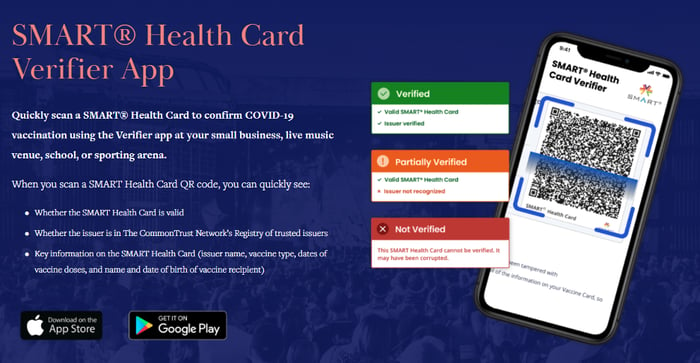One of the most challenging questions to ask right now is, “Are you vaccinated?” Governments, businesses, healthcare providers, and even citizens are left wondering what tools are available to help them enjoy social activities in the “new normal.” Showing proof of vaccination for travel is not new but showing proof of vaccination for a concert or a meal at a restaurant certainly is!
The good news is that for about 67% of Canadians, the answer to the vaccine question is “yes.” According to public health experts, that number needs to be 90- 95% to protect everyone from the COVID-19 virus.
While the federal government has announced plans to create a proof-of-vaccination document for international travellers as early as this fall, some provinces and territories are actively debating the need for domestic proof of vaccination. Four provinces are currently opting to move forward – Quebec, British Columbia, Manitoba, and Ontario.
Post-jab, many Canadians received printed records or emails with their vaccine date and information. In some situations, the honour system and printouts might be good enough, but not in every case.
Is it time we start empowering individuals with choice? To opt-in and share proof of their COVID-19 vaccination with whomever they choose?
A successful strategy needs to bridge many divides. From an equity standpoint, any solution must have a paper option. Not everyone carries a smartphone, and digital-only solutions will only exacerbate existing disparities. Blending the concepts of data privacy and ease of interoperability isn’t intuitive or easy, but it is possible. Helping the analog reality stay connected to an increasingly digital world demands innovation.
What if we took the exact same information that’s shown on a vaccination card and made it machine-readable? QR Codes, like the ones you can scan for a restaurant’s online menu, or the one you show when checking in to your flight, are convenient and ubiquitous. They can be stored digitally on a phone or printed and carried in a wallet.
Late August, Quebec was the first province to launch a vaccine passport, enabling citizens to show a photo ID and proof of vaccination using printable QR barcodes, a PDF on a mobile device, or by using the VaxiCode App available free of charge from the usual platforms. By doing this, Quebec has joined a growing number of public and private entities worldwide that have empowered people to decide whether they want to share their health information.
If it’s that easy, what’s the catch?
With a consent-based model, the biggest hurdle to overcome is the fragmentation of health information across many systems in our provinces and territories and the need for digital identity to authenticate and link people with their data. If we do this, it would be up to the citizen as the consumer to choose if they want to share their data.
 Others have done it. The University of California San Diego was the first U.S. health system to offer patients direct access to secure, publicly verifiable, and decentralized proof of vaccination. The Vaccination Credential Initiative defined the open-source SMART Health Card Framework. All the major EHR vendors, including Epic, Cerner, and MEDITECH, have adopted the VCI's design. However, businesses still face a patchwork of availability and a diverse public audience.
Others have done it. The University of California San Diego was the first U.S. health system to offer patients direct access to secure, publicly verifiable, and decentralized proof of vaccination. The Vaccination Credential Initiative defined the open-source SMART Health Card Framework. All the major EHR vendors, including Epic, Cerner, and MEDITECH, have adopted the VCI's design. However, businesses still face a patchwork of availability and a diverse public audience.
What side of this debate do you sit on? COVID-19 has accelerated our adoption and use of digital technology in healthcare. COVID-19 is also the universal ‘use case’ for social license – where citizens see how their aggregated data is used for the greater public good – to inform public health measures and policy. Let’s consider what we are doing for COVID-19 as a step in the right direction to give people digital access to their entire vaccine history. While we are at it, let’s empower citizens by enabling them to control their own health data.